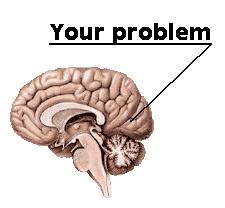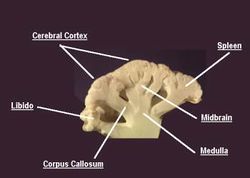Psychology
Article has template with poorly-worded warning Because nobody actually reads these things more than once, your Pavlovian conditioning should cause you to see the stop sign image and then view this article with skepticism without actually knowing why. Incidentally, the more text there is here, the less likely that anybody will read any of it. Oh say can you see, by the dawn's early light; what so proudly we hailed, at the twilight's last gleaming, Whose broad stripes and bright stars, through the perilous night... okay, you can go home now. |
“Total cures render all doctors obsolete. Except for Psychologists, because no one has found a cure for the universe yet.”
– The Hitchhiker's Guide to the Galaxy on Future Medicine.
“There will be no blaming Mother today, Freud, I just screwed her.”
– Carl Jung on Freud's theory and his mother.
“I'm not just being resistant, Dr. Freud! Damn it, I really DO want to have sex with my FATHER!”
“Now that's what I call pop psychology.”
– Dr. Ruth
Psychology (meaning "study of the mind" in Greek) is apparently a scientific study of behavior and the dirty stuff that goes on in people's minds. Also, everything leads to it. It was invented on October 16th 1854 by Jean Martin Charcot, Sigmund Freud's instructor. Since the dawn of time, humanity has wondered about the essential nature of human consciousness but has often been distracted by television and the temptation to fornicate with young, attractive men. Psychology helps us seek answers to questions such as, “What makes Catholic school uniforms so sexy?” or “Why would someone waste their time reading utter nonsense on the Internet?”
Modern psychology derives from several strands of science and philosophy, including alienism, hypnosis, neuroanatomy, and navel-gazing.
The Philosophic Roots of Psychology[edit | edit source]
Originally, states of consciousness were thought to be caused by a force called animal magnetism, first discovered as a universal force through the pioneering work of William Shatner with females of other cultures. Willing subjects were often rubbed against wool sweaters or each other, causing them to cling together, even in defiance of gravity. While under this mesmeric spell, they could be convinced they were somewhere else or to perform a ridiculous action, such as legislating the value of pi to be 3. From these demonstrations, researchers such as Sigmund Freud deduced that human consciousness was all about the nookie. In one book, Canak and Cura was noted as saying: "Yeah! The nookie. Yeah! So you can take that cookie and shove it up your…"
Metaphysics has often wondered about the true nature of consciousness. Attempts to discover the seat of reason have often confronted the problem of the homunculus, the observer who observes what is observed. As a result, psychologists are often very paranoid. The homunculus, after all, could be watching you, right now--whatever it may be. Indeed, modern psychologists like Dr. Carl Rogers have postulated the homunculus plays a central role in pointing out that licensed psychologists are often as incompetent as their unlicensed brethren, clearly demonstrating the role of thinking in false reasoning.
In the early part of the 20th century, American researchers such as Skinner and Watson attempted to make psychology a more scientific discipline. Naturally, this failed.
Branches of Psychology[edit | edit source]
Reverse Psychology (A.K.A. Ygolohcysp)[edit | edit source]
Don't read this article. Actually, never go to Uncyclopedia again. In fact, never go on the internet. It's scientifically proven to be bad for you. You'll probably be better off never looking at anything else vaguely funny for the rest of your life. Go play ball. Outside.
Still here?
Uncooperative jerk.
If you are still here then that has just proven that reverse psychology works.
Social Psychology[edit | edit source]
Social Psychology is a branch of experimental psychology that attempts to develop important jargon to explain to other psychologists concepts that are obvious to the average non-social psychologist, focusing on questions such as, "Why fat girls date less?" or "How did Hitler manage to convert so many Germans into blind, brainless followers resulting in the deaths of millions of human beings, as well as 6 million Jews?". To answer these very important questions for humanity, social psychologists survey white middle-class freshman college students taking Psychology 101. Students who refuse to cooperate with social psychologists receive a no passing grade. Other psychologists, feeling bad for them, having been the fat girl at one time, and needing freshman college students for their own important research, have promoted the tenure of social psychologists.
Developmental Psychology[edit | edit source]
Developmental Psychology is a branch of experimental psychology that deals with questions such as, "Why are babies heads so freaking big?", "Why am I gay?" and "Why me?". To answer these questions, developmental psychologists provide daycare services and then secretly experiment with the children (just like Piaget did with his own children).[citation not needed]
Cognitive Psychology[edit | edit source]
Cognitive Psychology is all about the thoughts that drive behavior. Cognitions are how people acquire, store and use information. Very few people really care about what cognitive psychologists do. Cognitive psychologists ask questions such as, "How long does it take for a person to decide whether a series of letters is a meaningful word or a bunch of crap?", "What is the capacity of short-term memory?", "Why are people so stupid?", and "I told you already, I'm not interested in dating you, just get the hell out of my apartment, why can't you understand that?". Because they cannot actually see into the human mind most of cognitive psychology is probably all a load of made up dung.
Counseling Psychology[edit | edit source]
Counseling Psychology is the branch of psychology aimed at helping people by being especially mediocre at everything the other branches of psychology do. Counseling psychologists role is to critically judge the other fields, through well formed assessments designed to detect their level of anti-multicultural judgment. Occasionally counseling psychologists show up for a research project only to discover a patient (OUCH! Client) hiding in a room, and give career assessments for 50 minutes until she/he/it goes away.
Abnormal Psychology[edit | edit source]
Abnormal Psychology is a branch of applied psychology that focuses on two questions: "Why do I read Uncyclopedia?" and "Why did we elect so many republicans during the 20th century?".
It also takes an in depth look at why anyone thought Sarah Palin was (or is) qualified to be anything but a decorative nutcracker.
Self Psychology[edit | edit source]
Self Psychology is a branch of psychology that deals with myself, yourself, self-esteem, self-awareness, self-efficacy, self-help, self-denial and self-loathing. Pretty much any word or phrase that includes the word "self" qualifies as the purvue of these psychologists who have generally failed to get good enough grades to work in the other branches of psychology. They will claim, however, it is their selflessness that qualifies them to go on and on and on about "the self". A sub-branch of self psychology, that which has spawned the seminal work "The Self of the Elf" by Peter North, is a virtually useless development outside of the North Pole series of self-pleasure inducing DVDs.
Selfish Psychology[edit | edit source]
Selfish Psychology is a lone branch of psychology that is so self focused that practitioners haven't bothered to explain to the rest of the world what exactly they are doing. Apparently, these psychologists consider that it is a waste of their time to communicate with others about what they are up to...their time is too valuable and we wouldn't understand anyway.
Shellfish Psychology[edit | edit source]
Shellfish Psychology is a failed branch of psychology that has reinvented itself as a new subject area concerned with sensory perception. One recent area of development, based on the science of animal magnetism, is the theoretical construct known as the lobster magnet. The lobster magnet phenomenon was first observed in the Atlantic rock lobster, known to carry an extremely high electrical current, thereby generating an attraction for heavy metal objects.
Psychoanalysis[edit | edit source]
Psychoanalysis is a branch of applied psychology that derives not from metaphysical inquiry, but from the science of medicine. Naturally, the focus of psychoanalysis is analyzing Psychos. Current medical research has tended to support some elements of the theory that it’s all about the nookie. Psychoanalysis continues to be practiced in Manhattan, Paris, Zurich, and other major guilt-manufacturing centers around the world. Psychoanalysts like to sleep with their patients. As a consequence, psychoanalysis is a discipline of many illegitimate children.
PhysioChemical Psychology[edit | edit source]
PhysioChemical involves dissecting the genital area of the patient in order to see what makes them 'tick'. It is a well known fact that the genitals have a profound effect on the brain. So, it is an opporutnity for Psychologists to poke at things and see what happens; as well as an justification for years of Anatomy and Physiology courses in Medical School.
A few famous cases studies in PhysioAnalysis are published. One, a Mr. Adolf Hitler whose left teste was lost in a freak battery accident. It was discovered that this created intense feelings of distaste for the circumcised, which often manifested in Anti-semitic feelings. Dr. Freud, also, often PhysioAnalyzed himself. His mother frequently complained that bodyparts had no place on the kitchen table.
Radical Behaviorism[edit | edit source]

Radical Behaviorism is a branch of study that rejects mentalism and rational thinking. That is, radical behaviorists believe that the experience of consciousness cannot be studied scientifically, but can be approached only by altering it with drugs. Thus, radical behaviorists tend to engage in behavior rather than thinking. They often engage in radical behavior, such as skating, body modification, and aggressive behavior toward authority figures. Radical behaviorists also use drugs.
Cognitive Science[edit | edit source]
Cognitive Science is a variety of pseudoscience that treats the human mind as something like a computer. As a consequence, they are always blaming it for their research projects failing to meet deadlines. Cognitive scientists often believe that simply adding more RAM to the human mind will help improve its performance. However, the scientific evidence clearly shows that overall circuit bandwidth is the true limiting factor. You can get a degree in Cognitive Science, but then, you can get a degree in Communications, too. What kind of job are you going to get with a degree like that?
American Psychology[edit | edit source]
In America, Psychology now functions as a way for psychologists to become richer by telling rich people who have nothing better to do that it's okay for them to be rich (provided they continue to pay exorbitant sums for this treatment) and that they still love their mothers (plutonically). Psychologists must, as part of their recurring license renewals, seek their own treatment by other psychologists. These professional courtesies are expected to be done without cost to either party which raises the question why would anyone pay for treatment that the practitioner themself wouldn't pay for.
Forensic Psychology[edit | edit source]
Forensic Psychology is the science of finding out why the hell you did not notice that damn bit of lip-gloss on your collar before coming home to your wife - and why she did not totally freak out but smiled rather disconcertingly.
"Grow Up, Ya Pansy"-style Psychology[edit | edit source]
“I wholeheartedly support the teaching of this to children. The world needs more Vs, and it's high time that human children stopped being wusses and started getting involved in local destruction."”
– Cthulhu on Facing Fears
Often practiced "In Vitro" (in day-to-day life), this branch of Psychology mostly deals with rational and irrational fears. Even poorly trained doctors can succeed with this. Take for example, a man with a debilitating fear of drowning. The doctor will take the man out to sea, and throw him overboard. When the patient reacts negatively, he is instructed to "Grow up" and "Stop being a pansy", and a myriad other carefully selected and taught words of encouragement.
There is about a 50% success rate, often dependent on how good the patient is at taking jokes, or how well stocked his/her underwear drawer is. There are still many studies pending on why the process fails as much as it succeeds. Some experts blame the Placebo effect. This is occasionally called "aversion" therapy by amateurs, but this is only a term used by people who want to sound smarter than they actually are.
Parapsychology[edit | edit source]
Parapsychology is the scientific study of ESP. Parapsychologists like to study phenomena such as telekinesis, mind-reading, teleportation, and synaesthesia. Most parapsychologists play Dungeons & Dragons. The rest are out getting laid (elves? aliens?). Real psychologists go to parties, edit Wikpedia articles, and get laid drubbing parapsychology as a pseudoscience, hoping to be issued by real scientists, in reward for their snide, with a white lab-coat and clip-board, upon which they can solemnly write about the Darwinian basis of penis-envy, and how spreading activation between "cogitons" is the mechanism of remembering.[1]
K-PAXian Psychology[edit | edit source]
This is a mildly controversial branch of the Science, although all reported cases seem to be extremely successful. It is a relatively small branch, and very limited in its documentation. It all started when a man named prot travelled to New York City and was mistaken for a mental patient, when he was in fact an alien working on a report about Earth. To a few of the patients, he offered the chance to return to his home planet of K-PAX. The promise of leaving Earth seemed to help cure many of them, and a few other required mildly inane tasks.
The concern is that many of these "tasks" were a somewhat unethical, but still an effective cure. One of prot's cases reportedly attempted to strangle another patient with an extreme fear of disease and pathogens. The upshot of the attempt was that the latter patient realized that anything could kill him. This patient supposedly removed his face mask then and there, and was released shortly after; he died in a bungee-hang gliding accident a few years later.
There are only a handful of cases on record, and many doctors refuse to make the "I'll take you to another planet if you get better" cure, as they really can't deliver it. The result is K-PAXian Psychology is now a dying breed, and it has slipped into the realm of Alternative Medicine. Notably, it is the only form of Psychology that Scientologists agree with or even practice.
Self-Help Books[edit | edit source]
According to this theory, it is possible to help oneself by reading several books. Books exist on many topics ranging from believing in yourself to making money to "penis" enlargement. Whether or not penii exist entirely depends on which Jungian archetype constitutes your Lacanian mirror imagine of Althusser's ISA, stemming from Derrida's traces and utterly vanishing in the wake of Freud's Oedipus, which asserts that your mother owns your "penis", but not your penis proper. It may be the other way around. The most popular books are those about believing in yourself because you have a lot of money. The authors of these books become insanely rich, and the clear solution to both problems addressed (as is mentioned in the appendix of each), you should write your own books.
Current Trends in Psychology[edit | edit source]
What do you think the current trends in psychology are?
And how does that make you feel?
That's perfectly understandable.
Criticism[edit | edit source]

“You don't know the history of psychology. I do! I've done the research!”
– Tom Cruise on Psychology
Psychology is founded on the principle of unfalsifiability. In general, any given psychological theory can explain any observed behavior with some accuracy. This is called the Dodo bird verdict, from the book by the pederastic Charles Dodgson, better known to the world as William Shakespeare. As a result, psychology is well prepared for the challenges of the 21st century. Tom Cruise is rumored to know Jack Shit about psychology or it's history; he is, however, stupid enough to be brainwashed and bankrupted at the hands of his religion, Scientology. It is expected that he will need counseling when Scientology finally collapses (if Scientology doesn't purchase the APA).
References[edit | edit source]
- ↑ Collins, A. M., & Loftus, E. F. (1975). A spreading-activation theory of semantic processing. Psychological Review, 82, 407-428.
Further reading[edit | edit source]
- The Behaviorial Pshchologist's Brain: How to Understand the Behavior of Behavioral Psychologists By Cameron Smith, PhD. (Partially Hy-Drogenated) Author of How to Protect Yourself and Others Against the Paranoid People Who ARE All Out to Get You
See Also[edit | edit source]
Articles:










